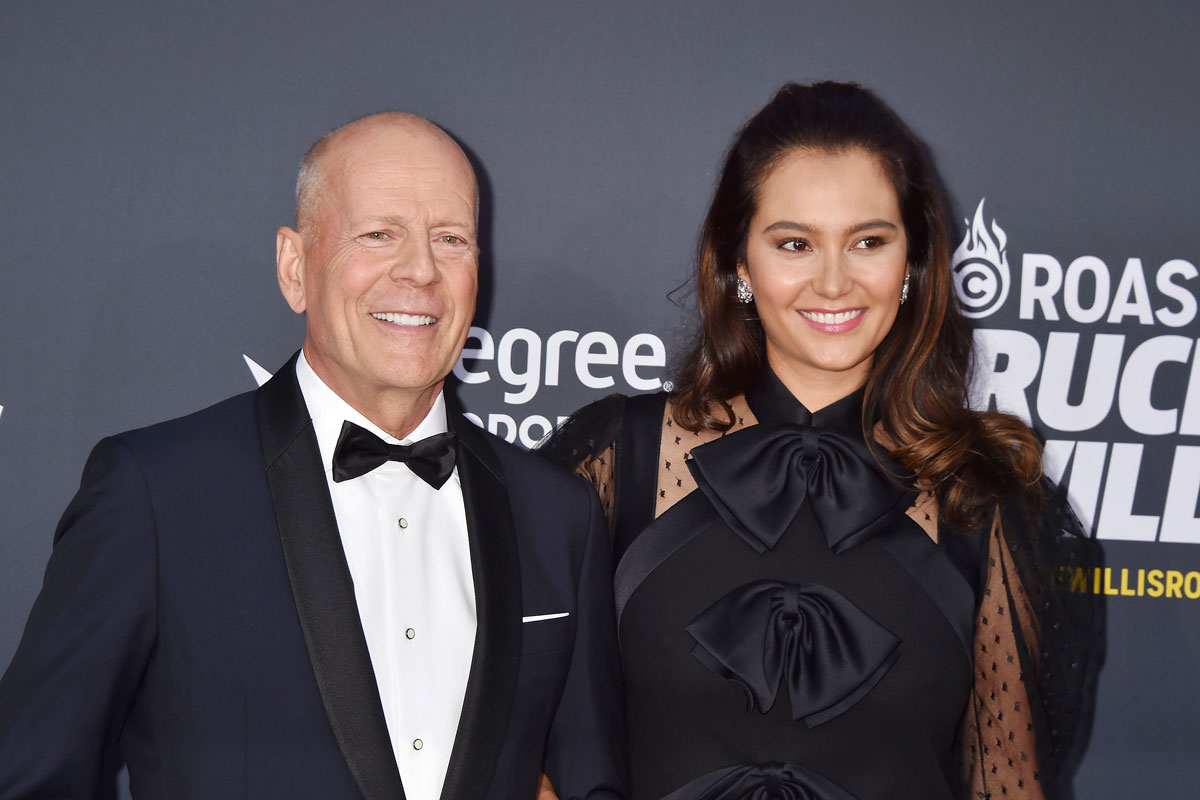
While caring for her husband Bruce amid his frontotemporal dementia (FTD) diagnosis, and raising their daughters, Emma Heming Willis has also decided to be a advocate for FTD patients and families. She wants to pay forward all the support and resources she’s received. Emma has made it clear that, unlike the actors in her family, being a public advocate is outside her comfort zone. But the cause of helping others understand aphasia and FTD is worth stepping out of her shell. What it shouldn’t have to involve, though, is needing to tell the media at large to stop making up “stupid headlines” about Bruce and how he’s doing. Yet that’s how Emma spent her Sunday:
“The headline basically says there is no more joy in my husband. Now, I can just tell you, that is far from the truth,” Emma said as she began the video. “I need society — and whoever’s writing these stupid headlines — to stop scaring people. Stop scaring people to think that once they get a diagnosis of some kind of neurocognitive disease that that’s it. ‘It’s over. Let’s pack it up. We’re — Nothing else to see here. We’re done.’ No.”
She then said that her family’s experience has been the “complete opposite of that” amid Bruce’s frontotemporal dementia (FTD) diagnosis.
“There is grief and sadness. There’s all of that. But you start a new chapter,” Emma said, adding that the new chapter is filled “with love, it’s filled with connection, it’s filled with joy, it’s filled with happiness.”
“That’s where we are. So stop with these stupid headlines. These stupid clickbaity things that freak people out. Stop doing that. There’s nothing to see here, okay?” she continued.
In the caption, Emma reflected further on the inaccurate reporting she’d seen as she encouraged media outlets to be “mindful” of how stories about dementia are framed.
“My experience is that two things can be true and exist at the same time. Grief and deep love. Sadness and deep connection. Trauma and resilience. I had to get out of my own way to get here but once I arrived, life really started to come together with meaning and I had a true sense of purpose. There is so much beauty and soulfulness in this story,” she wrote.
“Here’s what I’ve come to understand is that we are being educated by the wrong people. People that have an opinion versus an experience. People that have not taken the time to properly educate themselves on any kind of neurocognitive disease. Why can I be so bold and say that? Because I see headline after headline and blurbs of misinformation,” Emma continued.
She added: “I’m not even talking about my family, I’m used to the craziness of these farfetched headlines and stories. I’m just talking about baseline dementia awareness and what’s being fed to the public. You wonder why anxiety and depression is up in our society. I honestly think part of it has to do with this kind of clickbait, how things are framed and pushed out to us and how we have a split second to take that information in. Man, it’ll do a number on my psyche.”
Emma found a way to refocus the topic back to FTD education and awareness, but again, she shouldn’t have to deal with this. The only people who have the authority to speak on Bruce’s condition right now are Emma, Demi Moore, and his daughters. And their public comments of late have been filled with love, fondness, and even joy. Yes, the relationships have changed, but like Emma says, love and grief can coexist. By contrast, someone who’s never met Bruce wrote a negative, clickbaity headline about him. It’s tasteless, not to mention hurtful for those close to Bruce and for family members of people with dementia.
Photos credit: CPA, PacificCoastNews / Avalon, Media Punch/INSTARimages.com, Backgrid and via Instagram














My grandmother had dementia for many, many years and didn’t know who I was at the end (nor her sons, nor any family)…but she was full of wonder and joy and laughter and kindness – some of which she didn’t have in her former life due to the trauma she had experienced very young. She no longer remembered the trauma and it no longer pained her. Of course I would have liked to have her with full memory and ability to engage in a deeper way, but I can honestly say we have a lot of very sweet memories with her in the last years as well. She just lit up when she saw us even though she didn’t know who we were – we could just be PRESENT. My son only knew her in this stage, and he smiles so much when he talks about her and their fun times together playing with stuffed animals and sharing “forbidden” sour cream and onion potato chips (she would have NEVER allowed herself that in the past). I got to see her as I imagine she was before all the pain, and I am grateful.
I’m so sorry for your loss but what beautiful way to remember your beloved grandmother
Thank you for sharing loving memories of your grandmother with dementia, Nutella Toast. This was incredibly sweet! People suffering dementia can enter a sort of child-like wonder, and that’s definitely better than remembering suffering.
“Society or whoever writes these clickbait headlines”? The latter can be AI at this point, for all we know, so good lucky shaming them. It’s a very tough subject and she has my sympathy: as I navigate a similar situation myself, I know exactly what she means when she talks about feeling two (or more) things at the same time. However, it’s messy and hard to articulate, so she needs to be prepared to talk about it again and again or give up and protect their privacy, I don’t think that perfect, totally reasonable and nuanced headlines are coming their way any time soon.
Probably not but I think her major point here is that it’s doing more to spread misinformation and foster a sense of fear and despair when it shouldn’t. They may not stop writing the headlines but she can certainly fight back.
Good for her for trying to change the narrative!! My mother had early dementia before she passed away several years ago and Mrs. Willis does a great job describing the complicated dichotomy of grief and love during this heartbreaking journey, esp for caregivers who are seeing the changes in their loved one on a regular, if not daily, basis. Me and my family members chose to enjoy the good days and found ways to support each other during the not so good ones as we navigated a close relationship with this different somewhat childlike person, while glimpses of the same strong and independent woman we had always loved would also resurface. And my mother and I had always been close. So there was a still a lot of joy, not just pain in our interactions. It’s hard on everyone but not as impossible or utterly depressing as the “reporting” often portrays and I’m glad Emma is highlighting this.
True, but this “There is also joy” can be used to shut down people who want to be able to talk about the very real challenges they face. Yes to positivity, but recognize that forcing it on people, or presuming that is their experience, turns it toxic. Saying this as someone who was a live in caregiver for my grandfather with Alzheimer’s so he could have a last summer in his garden.
Also – can you please cut back on the embedded Instagram photos? I read this on the way to work. They eat up huge amounts of data and more than 1 or 2 inevitably crashes the page. I’ve noticed Instagram dumps in the last few days. Please keep the site useable for people reading on their phones.
OMG I thought I was only one having issues. I read this on my phone between jobs and sometimes it’s impossible to stay on the same paragraph with all the ads. It jumps around too much.
You are not the only one. The site is virtually unusable on mobile. I get they need to make money off of ads to pay the staff, but the way the site loads on a phone renders it useless.
Co-Sign.
@concern fae – you are absolutely correct that it is incredibly painful to slowly lose the person you knew and the caregiving is really hard on so many fronts. My Dad carried most of it with my grandmother and it was awful. 5 years after my grandmother’s death, I think I was trying to say that what remains are the moments of seeing a glimpse into joy and kindness and a version of her that was unchecked by what others would think of her or her deep anxiety and worries because she couldn’t remember to be self-conscious or scared (she had bad days for sure – I had just never really seen the happier side of her before). Caregiving is painful and exhausting no doubt, and having a safe space to say, “That was terrible” is important. I’m sorry for your loss.
I don’t even see the instagram pictures.
I think the main thing people should do in stories on dementia is to always put out health information about it– signs to watch out for and a PSA to be screened as early as possible by your doctor. Too many people believe that dementia is just a ‘natural’ part of getting older– and while of course there is some cognitive decline with age, that isn’t dementia. Getting screened early and going on the treatments currently available can extend people’s time “as themselves.”